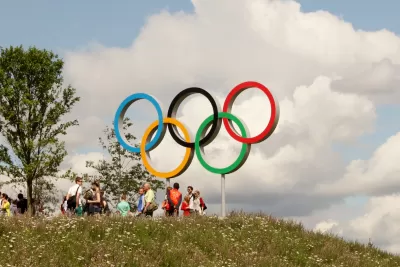The two-week competition is often touted as a galvanizing force for urban development. But that's only cities include the Games' legacy in their planning process from the start.

"Is hosting the Olympics worth it? Though organizers will invariably say yes, the truth is more complex than a yes or a no, and differs greatly based on the city." In an in-depth piece, Nate Berg explores the legacy of the Olympic Games for several cities, featuring Athens and London.
"For the modern era, Athens and London offer two contrasting examples of what cities can get from hosting the Olympics—a collection of unusable, debt-collecting sports venues or a catalyst for the regeneration of a huge swath of the city." Around London's Olympic venue, lots of new housing is under construction. Athens, on the other hand, is using some facilities to house refugees.
Of course, whether Olympics are successful after they're over has a lot to do with national conditions. But individual host cities' choices can play a bigger role. For instance, "Los Angeles's 1984 Olympics have proven to be one of the most fiscally responsible Olympics, which the city achieved by reusing many existing venues from its previous hosting stint in 1932 and other sites throughout the city."
Recently, London stands out as a city that focused its preparation on what would happen after the Games ended. Berg writes, "The Olympic site and its fringes are expected to see the development of about 10,000 new residential units by 2030, some directly related to the Olympic planning and some developed privately."
Now that the Games in Rio are over (and thankfully without any major disasters), we'll have to keep tabs on whether the city's preparations pay off in the long term.
FULL STORY: The urban games

Study: Maui’s Plan to Convert Vacation Rentals to Long-Term Housing Could Cause Nearly $1 Billion Economic Loss
The plan would reduce visitor accommodation by 25% resulting in 1,900 jobs lost.

Alabama: Trump Terminates Settlements for Black Communities Harmed By Raw Sewage
Trump deemed the landmark civil rights agreement “illegal DEI and environmental justice policy.”

Why Should We Subsidize Public Transportation?
Many public transit agencies face financial stress due to rising costs, declining fare revenue, and declining subsidies. Transit advocates must provide a strong business case for increasing public transit funding.

Paris Bike Boom Leads to Steep Drop in Air Pollution
The French city’s air quality has improved dramatically in the past 20 years, coinciding with a growth in cycling.

Why Housing Costs More to Build in California Than in Texas
Hard costs like labor and materials combined with ‘soft’ costs such as permitting make building in the San Francisco Bay Area almost three times as costly as in Texas cities.

San Diego County Sees a Rise in Urban Coyotes
San Diego County experiences a rise in urban coyotes, as sightings become prevalent throughout its urban neighbourhoods and surrounding areas.
Urban Design for Planners 1: Software Tools
This six-course series explores essential urban design concepts using open source software and equips planners with the tools they need to participate fully in the urban design process.
Planning for Universal Design
Learn the tools for implementing Universal Design in planning regulations.
Smith Gee Studio
Alamo Area Metropolitan Planning Organization
City of Santa Clarita
Institute for Housing and Urban Development Studies (IHS)
City of Grandview
Harvard GSD Executive Education
Toledo-Lucas County Plan Commissions
Salt Lake City
NYU Wagner Graduate School of Public Service




























